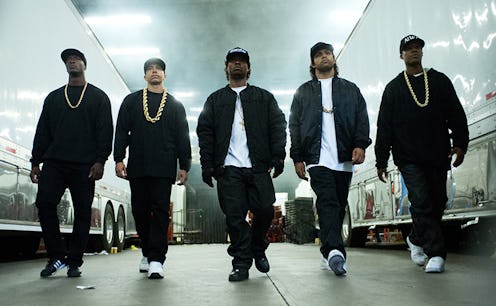
Straight Outta Compton takes place in the late 1980s, but it might as well be set in 2015. The film, about the rise of N.W.A., tackles the harsh realities of police brutality and race relations in the United States that lead to the rap group's signature song "F--k tha Police." And, while some things have changed the landscape of race relations in the past 20 years, the issue of police brutality against people of color remains. The "F--ck tha Police" lyrics are still hugely relevant, as are the comments of N.W.A.members made back in the '80s. "Some police overuse their authority, they judge you on what you wear instead of how you are. They stereotype you; make you get out your car, get you face down on the ground and then start questioning you. If I was white and in another neighborhood, they would not do that," Ice Cube said in an interview... in 1989. Think about that for a minute.
During a recent live YouTube Q&A session, NWA member DJ Yella remarked on how striking it is to see how little has changed since N.W.A.'s '80s run, saying, "Before we came along it was already going on. It was deep in the ghetto back then. We'd go to places [and it would be] 'Get on the ground! Face down!' But nowadays, 26 years later, it's like the same thing is still going on. It's like ("F--k tha Police") is brand new again."
F--k the police coming straight from the underground A young nigga got it bad cause I'm brown And not the other color so police think They have the authority to kill a minority
F--k the police and Ren said it with authority Because the niggas on the street is a majority A gang is with whoever I'm stepping And the motherf--king weapon is kept in A stash box, for the so-called law Wishing Ren was a nigga that they never saw Lights start flashing behind me But they're scared of a nigga so they mace me to blind me
DJ Yella and Ice Cube added that after a quarter of a decade, police brutality seems to have only gotten worse. Speaking specifically about the Black Lives Matter movement, Ice Cube was asked what he tells his son, O'Shea Jackson Jr., who plays the rapper in the film, before he leaves the house. Cube said that his number one instruction to his children is simple: "Make it home."
"My instructions to all my kids is 'make it home.' That's your only order, and that's your only instruction. ...That means do whatever it takes to make it to the house. The fact that we live in a world where we have to remind people that black lives matter is terrible in itself. ...I tell my kids, 'make it home.' That's the most important thing. Nothing else matters. Not to me," Ice Cube said.
Recently, the deaths of Sandra Bland and Freddie Gray in police custody and the shootings of Tamir Rice, Michael Brown and others have reawakened the same demand for change that was sparked by N.W.A. in 1988. With #BlackLivesMatter spreading the word on social media, and protests gaining supporters across the country, one is almost tempted to say that things are finally changing, that black people might be able to imagine a world in which they don't have to fear the police. But then, another unarmed black teenager is killed by the police, or less than one minute is spent discussing Black Lives Matter and police brutality during the first GOP Debate leading up to the 2016 elections.
It's tough to say what kind of a social impact Straight Outta Compton could have on the modern fight against police brutality. Some critics will no doubt argue that the fact that the film depicts race relations as they were 20 years ago, not as they are today, means it's irrelevant, while others might claim that NWA's violent lyrics could be interpreted as reckless a call to arms. (Of course, one only has to turn to another film, Ryan Coogler's heartbreaking Fruitvale Station, to see a film about modern police brutality.) But, that's all assuming it has an impact at all. So far, the stars of Straight Outta Compton appear to be keeping interviews and red carpet appearances focused on the film, and on N.W.A. Yes, that does include speaking about police brutality, but we have yet to see the creative minds behind Straight Outta Compton take a stand together against police brutality without being prompted (like when the cast of Selma wore "I Can't Breathe" t-shirts at the NYC premiere.)
Straight Outta Compton occupies a unique spot in pop culture because it is, at its most basic level, a biopic of N.W.A., not an expose on the history of police brutality in the U.S. Race and conflicts with the authorities might be a few of the major themes in the movie, but neither have been marketed as the main event. That spot belongs to the N.W.A., specifically the surviving members, Ice Cube, Dr Dre, DJ Yella and MC Ren, who have been the stars of the massive Straight Outta Compton press tour. That's not to say the star power behind Straight Outta Compton isn't a good thing. On the contrary, the fact that the film has easily accessible and recognized faces promoting it can only work in its favor. Hopefully, it will boost the creation and success of movies from black filmmakers and inspire more diversity in the film industry, while also maximizing the reach of a film that exposes police violence. Here's hoping we actually listen to what it has to say.
Images: Universal Pictures